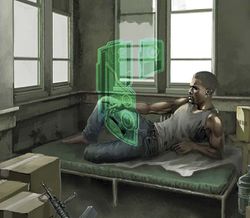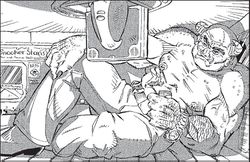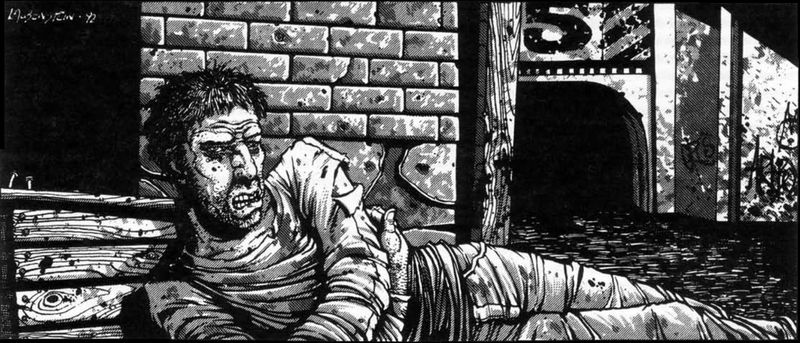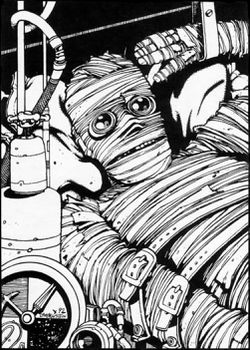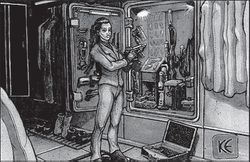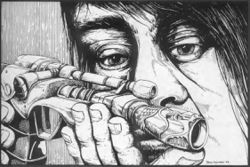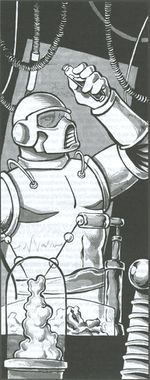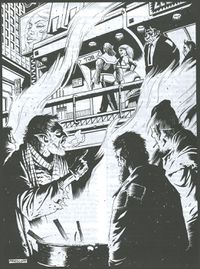Lifestyle
The rules on this page are no longer in effect.
Even though it may sometimes seem that many Shadowrun characters live in a bar, that is not so. Each character has a unique lifestyle, and the following information can be used to flesh out events that might occur in their life in between adventures. Most important is the effect a character's lifestyle has on healing.
Lifestyle measures the quality of the character's daily life and his or her living expenses, including shelter, food, entertainment, clothing, and so on. It does not cover technical resources, weapons, magical equipment, professional hirelings, or other major impersonal items. The player and the gamemaster can also make other decisions about interesting details of the character's lifestyle.
Almost infinite variations are available. For example, a character might live in an abandoned building, but install enough conveniences to qualify as having a Luxury lifestyle. Keeping all those gadgets running, buying security, maintaining water supplies, and keeping a low profile will cost as much as a mansion in a ritzy neighborhood.
Lifestyle Game Effects
Downtime
| Lifestyle | Threshold |
| Streets | 6 |
| Squatter | 5 |
| Low | 4 |
| Middle | 3 |
| High | 2 |
| Luxury | 1 |
For any period of extended downtime, roll a die. If the result is greater than the threshold for the character's lifestyle, the character has a brief positive side-story. If the result is less than or equal to the threshold, the character has a brief negative side-story. Random prompts may be used.
Lifestyle and Healing
| # | Condition | Recovery Time |
Lifestyle | Total Time | |
| Minimum | Temp. Cost | ||||
| 0 | None | ||||
| 1 | Winded | Short Rest | |||
| 2 | Exhausted | Long Rest | |||
| 3 | Minor Injury | 1 Day | Low | 100¥ | 1 Day |
| 4 | Moderate Injury | 1 Week | Middle | 1,500¥ | 1 Week |
| 5 | Serious Injury | 3 Weeks | High | 7,500¥ | 1 Month |
| + | Deadly Injury | 1 Month | Hospital | 30,000¥ | 2 Months |
A character's lifestyle limits the severity of wound that they can heal from without improving, at least temporarily, their standard of living. Wound severity for wounds received in Tactical Combat is determined according to the number of individual Strikes taken by the character (see table). Where a wound's severity requires a level of lifestyle that the character isn't at, the character must improve their living situation, either by buying up to a higher level, or paying a temporary lifestyle cost long enough to heal. Temporary lifestyle costs only need to be paid if the character isn't already living at the listed lifestyle. For instance, someone at a middle lifestyle does not face any additional cost for a moderate or less-severe injury. Except for where an injury requires hospitalization, characters may still work downtime jobs.
Wound recovery is iterative, such that spending the required amount of time at the required level of care reduces the degree of injury by one level. For example, recovering from a deadly injury requires a full two months: a month of hospitalization, three weeks at high lifestyle or better, a week at middle lifestyle or better, and a day at low lifestyle or better.
Healing may still be attempted even if the character is not at the required lifestyle. Instead, at the end of the listed amount of time, they make a skill check with an appropriate skill, which may be assisted by others help. On a Success, they heal as normal. On a Twist, their condition worsens by one step. With a Cost, the next check to heal from the current injury, if any, faces Disadvantage.
Base Lifestyles
Luxury
This lifestyle offers the best of everything: spacious, ritzy digs, lots of hi-tech toys, the best food, and you-name-it. The character has a household staff or a maid service or gadgets to do the mundane chores. He has a powerful car, maybe even a hot sports model or a chauffeured limo. Whether it's a big house, a snazzy condo, or the penthouse in a top hotel, this is the life for the high-stakes winners in the business: top executives, government big shots, high-level yakuza, and the shadowrunners who pull off the big scores.
Cost: 100,000¥ a month and up-up-up!
High
A High lifestyle offers a roomy house or condo, good food, and the tech that makes life easy. So what if the character does not have the same perks as the big boys, but neither does he have as many people gunning for him. Their home is in a secure zone or protected by some good solid bribes to the local police contractor and gang boss. There is housekeeping service or enough tech to take care of most chores. A luxury commuter car is at their beck and call. This is the life of the well-to-do on either side of the law: mid-level managers, senior yakuza, and the like.
Cost: 20,000¥ a month
Middle
The Middle lifestyle is not the best of everything, but is far from the worst. It offers a nice house or condo with lots of comforts. So characters eat some nutrisoy as wall as natural food, but at least the autocook has a full suite of flavor faucets. Characters also have a commuter car or first-class tube pass. The is the lifestyle of the ordinary successful ware-earners or criminals.
Cost: 5,000¥ a month
Low
With this lifestyle, the character has an apartment, and nobody is likely to bother him much if he keeps the door bolted. Meals are regular. The nutrisoy may not taste great, but at least it's hot. And power and water are available during their area's assigned rationing periods. When those of the Low lifestyle travel, they ride the tube. Factory workers, petty crooks, and other folks stuck in a rut, just starting out, or kind of down on their luck tend to show up here.
Cost: 1,000¥ a month
Squatter
Life stinks and most of the time, so does the character. He eats low-grade nutrisoy and yeast, adding the flavors with an eyedropper. Their home is made-over building, converted into barracks, divided into closet-sized rooms, or maybe he just rents out a coffin-sized sleep tank by the night. The only thing worse than Squatter lifestyle is living out on the streets.
Cost: 100¥ a month
Streets
The character lives on the streets! Or in the sewers, steam tunnels, condemned building, or whatever flop he or she finds for the night. Food is where he finds it, bathing is a thing of the past, and the only security is what he creates for himself. The bottom of the ladder, inhabited by down-and-outers of all stripes.
Cost: Free
Special Lifestyles
Hospitalization
This is a special lifestyle, applicable only when a character is sick or injured. The character is confined to a hospital, be it a real one, a clinic equipped at a hospital, or a private location with the necessary equipment installed. Characters cannot own this lifestyle. They only pay for it until they get well or go broke, whichever comes first.
Cost: 1,000¥ per day
Lifestyle Extras
Lifestyle extras are added onto a base lifestyle and their cost adds to the monthly lifestyle cost for the character. Lifestyle extras may have a minimum required base lifestyle.
Armory
Quite popular among shadowrunners is a room dedicated to weapons. Backup weapons, ammunition, and armor for the character are stored here.
Provides Trick "I've Got You Covered": Given access to the armory, one or more people are considered fully armed for the purposes of Tactical Combat.
Cost: 1,000¥ per month
Requires: High lifestyle or better
Collection
You have some kind of collection. Describe what it's of and determine a collecting Skill, which may be untrained. You can take this multiple times, selecting different kinds of collections and collecting Skills.
When you search in your collection, roll your collecting Skill. On a Success, you have just the thing.
On a Twist, pick one (the GM will fill in the details):
- You don’t have it, but you know exactly who does.
- You don’t have it, but you have something that might substitute for it reasonably.
- You have it, but it’s unusable until you complete another task.
With a Cost, using your items instead of hoarding them means that you owe your collection a Favor. You’ll suffer Disadvantage on future rolls of this sort until you add something cool to the collection, as you become loath to risk what you’ve got. The GM will tell you what item you desire so strongly for your collection.
Cost: 100¥ per month per type
Requires: Low lifestyle or better
Requires: Middle lifestyle or better for 3+ collections
Garage
| Type | Attached | Separate | |
| Cost | Minimum Lifestyle | ||
| Car | 100¥ per month | Low | 100¥ per month |
| Truck | 200¥ per month | Middle | 200¥ per month |
| Boat | 5,000¥ per month | High | 250¥ per month |
| Helicopter | 10,000¥ per month | Luxury | 500¥ per month |
| Airplane | 20,000¥ per month | Luxury | 1,000¥ per month |
A garage is a large covered area with enough space to park and maintain a single vehicle. Can be purchased multiple times. Required for owning aircraft or watercraft, though very small watercraft (e.g., water scooters) may be parked in a garage for cars. Garages make vehicles immune to theft as a lifestyle downtime negative consequence. A garage is required for a vehicle-related workshop.
Different costs are applied for whether the garage is attached to the home or not. Attached garages have an associated minimum lifestyle. Separate garages may be purchased, and should be assumed to be at least 20-30 minutes away from the character's home, possibly further depending on the living circumstances.
Library
You have a large collection of knowledge on a particular topic available to you. When you access it looking for information, ask the GM three related questions and then roll an appropriate Skill.
- On a Success, the GM will answer two of them.
- On a Twist, the GM will answer just one of the questions.
- With a Bonus, you may ask one follow-up question based on those answers. Your follow-up cannot be a question the GM did not answer.
- With a Cost, one of the answers will have a Flaw. The GM will tell you what it is.
Cost: 100¥ per month per topic
Requires: Low lifestyle or better
Requires: Middle lifestyle or better for 3+ topics
Panic Room
A secure room for a few people that effectively can't be broken into. Contains a supply of air, water, and food, as well as redundant lines of communication to call for help.
Cost: 1,000¥ per month
Requires: High lifestyle or better
Secret Room
This is a simple empty, two-meter-by-two-meter space that has been built out of the view of passers by. It provides concealability (Disadvantage to find) and full cover. A barricaded alley or abandoned cars are examples things that could serve as a private room for people who do not live in an actual building. For people in a building, this is simply a room cleverly placed to be difficult to see.
Cost: 100¥ per month
Requires: Squatter lifestyle or better
Workshop
You have a workshop dedicated to a particular craft. You can purchase this several times to support several types of crafts. When you break down an item for parts, talk shop with another expert, spend time preparing supplies, or gather a new tool or ingredient, gain a Supply Token. When you succeed at creating an item, you can spend three Supply Tokens to pick from the following list of special properties.
- It is superior quality and using it gives Advantage.
- It has protection. The first time the GM tries to take it away or break it on a Twist, you negate that Twist and tell them what modifications you made to prevent such an occurrence. (e.g. “Actually, it is biometrically locked, so it electrocutes that girl when she tries to pick it up.”)
- It is idiot-proof. It counts as a Trick for whoever is using it. (This means that anyone using it can roll on the Skilled chart without needing any other Skill, or can spend an Action Point to automatically succeed.)
- Add some cool detail or effect to it like you would with a Bonus.
Examples: Chemical/Mechanical/Electrical/Bio Engineering, Software Development, Woodworking, Alchemy
Cost: 1,000¥ per month per type of craft
Requires: Middle lifestyle or better
Assistant
You have a human or VI assistant. As such, you don’t have to be around for the actual fabrication process of items you design. You just give the instructions and your assistants carry it out, saving you the time. You still make the roll, however.
Cost: 500¥ per month
Requires: Workshop, Middle lifestyle or better
Specialized Equipment
Pick a particular type of item within the craft your workshop is dedicated to. When you create that type of item, you have Advantage. Note, the type of item must be more specific than the craft. You can select this multiple times.
Cost: 500¥ per month per type
Requires: Workshop, Middle lifestyle or better
Diagnostic Equipment
You may spend two Supply Tokens to research an item you found that you previously did not understand.
Cost: 500¥ per month
Requires: Workshop, Middle lifestyle or better
Miniaturization Equipment
Whenever you successfully make an item smaller than seems possible, conceal an item inside a larger item, or fit multiple modalities on the same item despite a Disadvantage for that difficulty, gain two Action Points.
Cost: 500¥ per month
Requires: Workshop, Middle lifestyle or better
Macro-construction Equipment
Whenever you successfully make an item bigger, taller, heavier, or more breathtaking than seems possible despite a Disadvantage for that difficulty, gain two Action Points.
Cost: 500¥ per month
Requires: Workshop, Middle lifestyle or better
Recycling Equipment
When you take apart an item you spent Supply Tokens on, even if it’s broken, gain three Supply Tokens instead of the usual one for scrapping an item.
Cost: 500¥ per month
Requires: Workshop, Middle lifestyle or better
Lifestyle Modifiers
Lifestyle modifiers apply a percentage change to the cost of accommodations. Multiple modifiers, including multiple modifiers of the same type (e.g., multiple roommates), are multiplied together.
Bad Neighborhood
You live in a lower-security dangerous neighborhood than your lifestyle would normally imply. Your threshold for a positive downtime is one higher than normal.
Cost: x 60%
Requires: Middle lifestyle or better
Guests
One character may crash at another's place. This can be a cost-efficient arrangement, but the host ends up taking responsibility for their guest. When rolling for downtime, the host uses the lower of their result and their guests'.
Cost (Host): x 120% per guest
Cost (Guest): x 0
Roommates
Two or more characters may share a lifestyle to reduce costs. If a character with a roommate rolls equal to their downtime threshold, receiving a negative side-story as a result, they drag one roommate into that side story.
Cost (Each Roommate): x 80% per roommate



